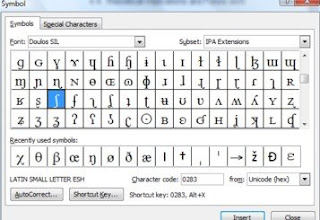Finding IPA symbols to post online can be a pain; what I do is copy and paste using the handy gadget at ipa.typeit.org … how about a link to this from the blog?OK, done. But I actually told you about this little utility on 28 November 2008, little more than three months ago. As I said then,
You are restricted to the characters shown here. There is no length-mark available, though you could use an ordinary colon.
 At that time I also wrote about David Montero’s IPA character map.
At that time I also wrote about David Montero’s IPA character map.Personally, I do not use either of these. On my laptop I use Mark Huckvale’s Unicode Phonetic Keyboard, but I still cannot get it to work in Windows Vista Home Premium, which is what I have on my desktop computer. So what I do is compose my text in Word, then copy and paste into blogspot.
In Word 2007 for Windows it is very easy to insert IPA symbols or other special characters. Go to Insert | Symbols | Symbol | More symbols, and find your symbol in the drop-down box. (I’ve put a shortcut on my Quick Access Toolbar to save time.)
Select a suitable font (one that includes the IPA). Find your character in the display box, scrolling as needed, and Insert. Characters you have used recently will be available for reuse.
You can set up macros (Shortcut Key), too, if you want.
 Most of the IPA symbols are in the IPA Extensions subset. But æ ð ø are in the Latin-1 Supplement; ŋ œ are in Latin Extended-A, and β θ χ are in Greek and Coptic. Stress marks and length marks are in Spacing Modifier Letters, while non-spacing diacritics are in Combining Diacritical Marks.
Most of the IPA symbols are in the IPA Extensions subset. But æ ð ø are in the Latin-1 Supplement; ŋ œ are in Latin Extended-A, and β θ χ are in Greek and Coptic. Stress marks and length marks are in Spacing Modifier Letters, while non-spacing diacritics are in Combining Diacritical Marks. Another way in Word is to type in the Unicode number in hex, select, and do Alt-X: hey presto, the code number turns into the character. Then copy and paste. For Unicode numbers, go to the Unicode charts, or consult my Unicode page (which will be useful if you are not sure about which symbol denotes which sound).
Lastly, you can always select, copy and paste from a web document, e.g. a Wikipedia article or one of my phonetic pages. If you want to post a comment using one of the symbols in my posting (or someone else’s), you can copy and paste that too.





When I need to write IPA in Firefox, I normally use the transliterator add-on (https://addons.mozilla.org/en-US/firefox/addon/883). It knows X-SAMPA and the Kirshenbaum notation known from Usenet.
ReplyDeleteI use
ReplyDeletehttp://weston.ruter.net/projects/ipa-chart/view/keyboard/
I thought I'd found the link through you, but perhaps not. It has the full complement of characters and diacritics.
Of course I only use a /ə/ and a /ɛ/ once in a blue moon.
My favourite tool is the IPA Writer at http://www.ipawriter.com
ReplyDeleteWow. Thank you so much for creating such a well-organized Unicode page. It has been so helpful to me. I was a linguistics minor when studying for my undergrad but am now a Spanish graduate student and your page has helped a ton while transcribing medieval Spanish literature for my History of the Spanish Language class! Much better than hunting for the symbol.
ReplyDeleteI use free GNU Emacs editor which come with its own ipa, ipa-kirshenbaum, and ipa-x-sampa input methods.
ReplyDeleteYou must install Unicode font for some unusual IPA chars...
It works fine under Linux and Windows...
Hi. I'm looking for a translator to IPA symbols to words.. As if I want to write : xeʔuˈɓü and the translator will be found the sentence that means..
ReplyDeleteI hope you'll can help me, I am french and I have a lot of difficulties with phonetics
Thanks.
Lilou
DeleteIf you mean translation software, I'm afraid that's a theoretical impossibility — for most languages. For French, for example, the sound transcribed in IPA as a may represent the verb forms a or as or the preposition à or even the interjection ha!. For English, the problems are considerably harder.
It would be easier to use text-to-speech software. As French speaker, you would know which word the sound a was most likely to represent in the text that is being read. The problem is that few if any text-to-speech programs have been developed that can read IPA symbols.
If the text to be read is in a language that you don't know, I think it's hopeless. You may find a program that can turn xeʔuˈɓü into speech sounds, but then you'll have to find a human being who recognises the language and the word/sentence.
In any case, if you don't understand the symbols, you'll probably make mistakes when you type them in.
On the whole, it will be quicker and easier to learn IPA.
A simple tool which might help you is this web page. If it works on your computer system, you can click on the symbols one by one and hear how each one sounds.
How to type it, video tutorial:
ReplyDeletehttps://www.youtube.com/watch?v=Ukp1TTzJCck&feature=youtu.be